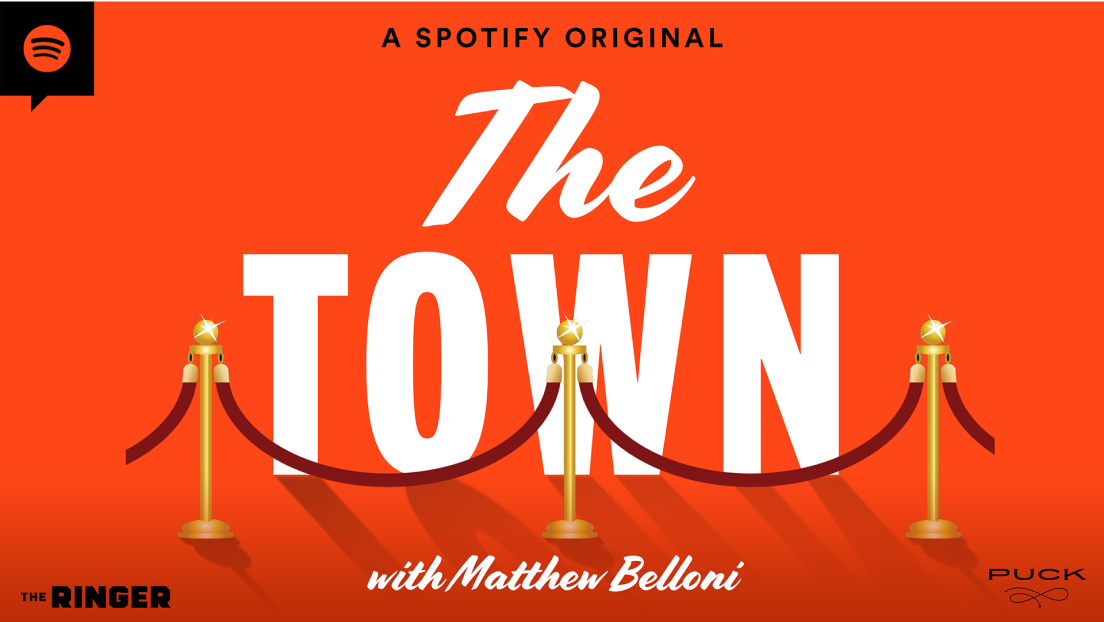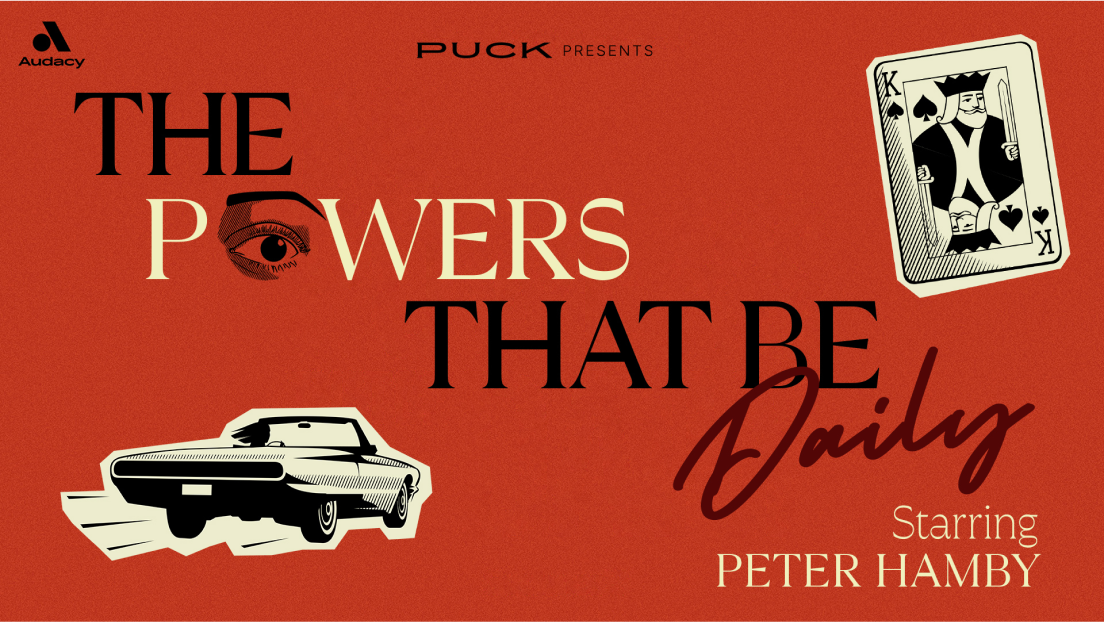
|
PREVIEW VERSION
|
|
|
|
Iger’s
Fubo Curveball, L.A.’s Political Fire, TV After Broadcast
|
Welcome back to The Daily Courant, your afternoon digest of Puck’s
best new reporting.
Today, we lead with Eriq Gardner’s incisive summation of two legal dramas roiling the worlds of media and entertainment: The Times’ high-profile copyright battle against Sam Altman’s OpenAI, and the Supreme Court’s imminent decision on the fate of TikTok. Will the social media phenomenon survive the weekend?
Plus, below the fold:
Marion Maneker digs into an art world micro-scandal surrounding the estate of Peter Beard. Sarah Shapiro talks to Hill House Home boss Nell Diamond about the Pyrrhic success of the company’s category-defining Nap Dress. Tara Palmeri and former Trump official Ken Cuccinelli debate the viability of the next administration’s deportation strategy. And Julie Davich
chronicles a surprising development in the art brokerage business.
Meanwhile, on the podcasts: Democratic rising star Mallory McMorrow joins John Heilemann on Impolitic to investigate a Trumpworld mystery. On The Varsity, Sara Fischer joins John Ourand to contemplate the ripple effects of a TikTok ban on sports media. On The Town, Matt Belloni
connects with CBS Entertainment president Amy Reisenbach to envision the end state of broadcast television. And on The Powers That Be, Dylan Byers and Peter Hamby examine L.A. mayor Karen Bass’s bleak political future.
|
|
|

|
Eriq Gardner
|
|
On Tuesday, lawyers for OpenAI urged a judge to dismiss key claims in The New York Times
Company’s high-profile lawsuit against Sam Altman’s $157 billion A.I. lab. Yes, it’s just one of more than 35 major lawsuits poised to set the legal table for the future of generative A.I., but this case is notable for a number of reasons—not least of which is the fact that the Times is represented by Susman Godfrey, a firm skilled at netting colossal paydays. Eriq evaluates the potential outcomes before turning to the odds that TikTok’s Chinese parent, ByteDance, will
be forced to divest from the social media platform before the weekend is up. While there are signs suggesting the ban will be upheld by the Supreme Court, don’t expect a bold, sweeping opinion. This could easily become a fractured ruling with concurring opinions galore, leaving little in the way of clear precedent. And, of course, Trump remains a wild card…
Read Now
|
|
|

|
Marion Maneker
|
|
Last month, lawyers for the late artist Peter Beard’s studio, run by his widow, Nejma, filed a
lawsuit against Heritage Auctions, disputing the sale of 51 lots held in October. The studio argues that the consignor never had a right to sell the items, and is upset that Heritage didn’t consult with them about the nature of the materials before the sale, as many of the lots were manuscripts or personal photographs, diary pages, or even books. Interestingly, the studio seems most concerned with asserting its role as the arbiter of what is, and what is not, a Beard work of art. The strength
and quality of an artist’s studio or foundation can be the difference between their legacy dissipating into the ether or gathering strength with time. And soon enough, Beard’s own fate might be decided.
Read Now
|
|
|

|
Sarah Shapiro
|
|
Nell Diamond made one of the more fortuitous pivots in recent fashion business history when she
redirected her somnolent D.T.C. bedding brand, Hill House Home, toward a singular blockbuster product that defined the pandemic era and now comprises more than 20 percent of the company’s revenue: the Nap Dress. It transformed the business, and helped Hill House Home generate more revenue in a single day in 2021 than in all of 2019. The knock on Diamond, of course, is that her company hasn’t evolved beyond the Nap Dress or its current, online-only Shopbop and Saks partnerships. Most brands dream
of a product that can define a category, as Hill House did with its Nap Dress. Fashion, however, is about the future. So what does Diamond have planned for an encore?
Read Now
|
|
|

|
Tara Palmeri
|
|
One of Trump’s most quoted campaign promises was to launch, on day one, “the largest deportation
program of criminals in the history of America.” But, perhaps needless to say, he’s not going to be able to remove millions of illegal immigrants in a week, or even in a year. Actually removing people is the hypothetical end point of what will inevitably be a dragged-out, vociferous, politically fraught, and logistically complex process involving warrants, identification, surveillance, detention, and many, many lawyers. For a candid perspective on how it would actually work—and what it might
cost—Tara spoke with Ken Cuccinelli, a former Virginia attorney general and Trump’s former acting number two at the Department of Homeland Security.
Read Now
|
|
|

|
Julie Davich
|
|
Gurr Johns’ core business for the past 110 years has been appraisals—a service many collectors
view as a necessary evil to placate their insurance companies and tax advisors, rather than as an investment of sorts. Now, all that is changing: New C.E.O. Maarten ten Holder wants to expand the firm’s advisory services—which comprise only a small part of the business and are usually just an upsell on the appraisal relationships—and is looking to launch a brokerage offering, too. Gurr Johns built its core business on the trust of clients who largely don’t want the auction houses to know what’s
in their portfolio and make deals on that information. Will this new brokerage business undercut that positioning?
Read Now
|
|
|

|
John Heilemann
|
|
John is joined by Democratic Michigan state senator Mallory McMorrow to discuss the commencement
of Trump 2.0 and where her party goes from here. Mallory opines on the Pete Hegseth confirmation hearing and explains why women are greeting Trump’s second term so differently than his first, despite the profusion of appointees and advisors accused of sexual misconduct; the importance of paying less attention to what Trump says and more to what he actually does; why Kamala Harris lost and Joe Biden never should have sought a second term; and what her party needs to do to start winning
again.
Listen Now
|
|
|

|
John Ourand
|
|
Axios’s Sara Fischer joins John for a wide-ranging conversation covering the latest trends
transforming the sports media landscape: the striking Disney-Fubo merger, DirecTV’s new $70/month sports package, the potential ripple effects of a TikTok ban on sports media, and the murky future of R.S.N.s in major markets like Chicago and New York.
Listen Now
|
|
|

|
Matthew Belloni
|
|
Matt is joined by Amy Reisenbach, the president of CBS Entertainment, to talk about how
broadcast networks continue to succeed despite living in a world of streaming and social media. She discusses why these linear networks are still surviving, how a hybrid broadcast-streaming model can be beneficial for legacy networks, and the challenge of programming shows for audiences of different age ranges on linear versus streaming. Matt finishes the show with a prediction about a new sports bundle from DirecTV.
Listen Now
|
|
|

|
Peter Hamby
|

|
Dylan Byers
|
|
Dylan Byers joins Peter to reflect on the ongoing wildfire disaster in Los Angeles and the
political blame game that’s only just begun—underscored by Mayor Karen Bass’s perplexing response to the crisis. The duo also discuss MSNBC president Rashida Jones’s foreshadowed departure from the network and who could potentially replace her.
Listen
Now
|
|
|
Need help? Review our FAQ page or contact us for assistance. For brand partnerships, email ads@puck.news.
You received this email because you signed up to receive emails from Puck, or as part of your Puck account associated with . To stop receiving this newsletter and/or manage all your email preferences, click
here.
|
Puck is published by Heat Media LLC. 107 Greenwich St, New York, NY 10006
|
|
|
|



_01JHN8RM165DAP993Z2XKZBC9N.png)
%20copy_01JHN8RK8NF5WAG84WHWK1D5FS.png)
_01JHN8RMPJPNY4R1S180TWPSXH.png)
_01JHN8RNKRF8Z55NZFX8HBQE1Q.png)
_01JHN8RP4Y601Z1FFZTW295HT3.png)






















